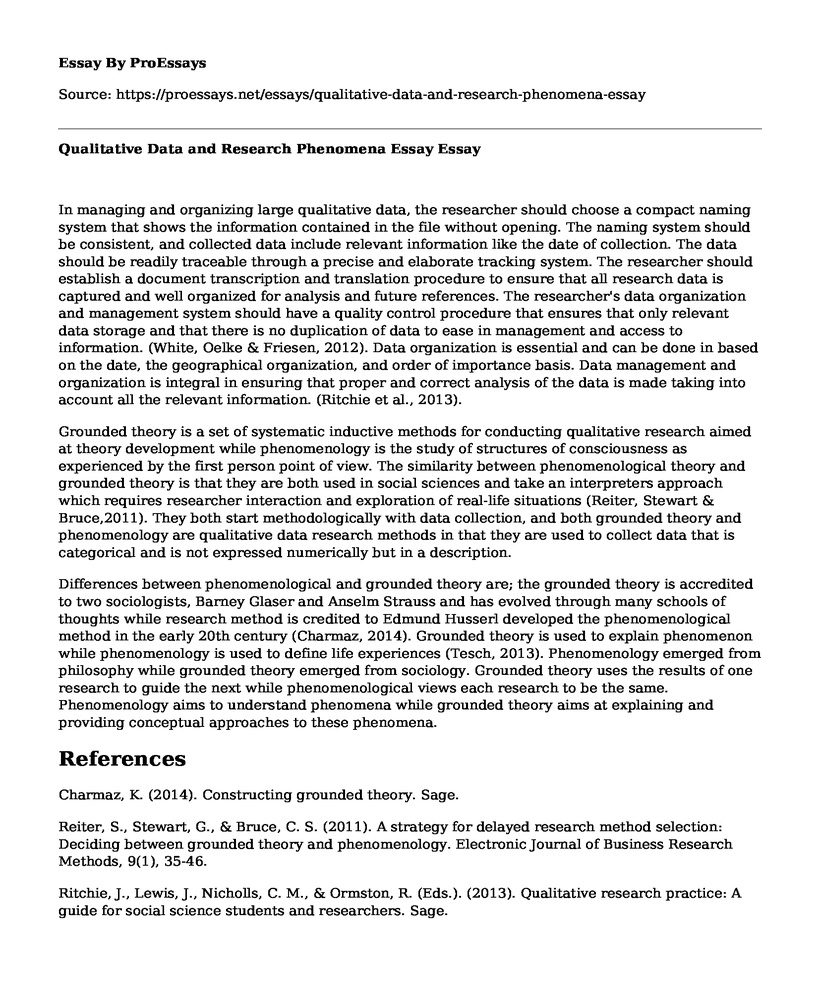In managing and organizing large qualitative data, the researcher should choose a compact naming system that shows the information contained in the file without opening. The naming system should be consistent, and collected data include relevant information like the date of collection. The data should be readily traceable through a precise and elaborate tracking system. The researcher should establish a document transcription and translation procedure to ensure that all research data is captured and well organized for analysis and future references. The researcher's data organization and management system should have a quality control procedure that ensures that only relevant data storage and that there is no duplication of data to ease in management and access to information. (White, Oelke & Friesen, 2012). Data organization is essential and can be done in based on the date, the geographical organization, and order of importance basis. Data management and organization is integral in ensuring that proper and correct analysis of the data is made taking into account all the relevant information. (Ritchie et al., 2013).
Grounded theory is a set of systematic inductive methods for conducting qualitative research aimed at theory development while phenomenology is the study of structures of consciousness as experienced by the first person point of view. The similarity between phenomenological theory and grounded theory is that they are both used in social sciences and take an interpreters approach which requires researcher interaction and exploration of real-life situations (Reiter, Stewart & Bruce,2011). They both start methodologically with data collection, and both grounded theory and phenomenology are qualitative data research methods in that they are used to collect data that is categorical and is not expressed numerically but in a description.
Differences between phenomenological and grounded theory are; the grounded theory is accredited to two sociologists, Barney Glaser and Anselm Strauss and has evolved through many schools of thoughts while research method is credited to Edmund Husserl developed the phenomenological method in the early 20th century (Charmaz, 2014). Grounded theory is used to explain phenomenon while phenomenology is used to define life experiences (Tesch, 2013). Phenomenology emerged from philosophy while grounded theory emerged from sociology. Grounded theory uses the results of one research to guide the next while phenomenological views each research to be the same. Phenomenology aims to understand phenomena while grounded theory aims at explaining and providing conceptual approaches to these phenomena.
References
Charmaz, K. (2014). Constructing grounded theory. Sage.
Reiter, S., Stewart, G., & Bruce, C. S. (2011). A strategy for delayed research method selection: Deciding between grounded theory and phenomenology. Electronic Journal of Business Research Methods, 9(1), 35-46.
Ritchie, J., Lewis, J., Nicholls, C. M., & Ormston, R. (Eds.). (2013). Qualitative research practice: A guide for social science students and researchers. Sage.
Tesch, R. (2013). Qualitative Types: Analysis Typ. Routledge.
White, D. E., Oelke, N. D., & Friesen, S. (2012). Management of a large qualitative data set: Establishing trustworthiness of the data. International Journal of Qualitative Methods, 11(3), 244-258.
Cite this page
Qualitative Data and Research Phenomena Essay. (2022, Apr 04). Retrieved from https://proessays.net/essays/qualitative-data-and-research-phenomena-essay
If you are the original author of this essay and no longer wish to have it published on the ProEssays website, please click below to request its removal:
- Competition and Bankruptcy of General Motors SWOT Analysis
- Ways to Expand the Current Research Project on Holocaust
- Essay Example on Letter from Birmingham Jail: A Moral Response to Criticism
- Evaluating Credible Sources for Research Papers - Essay Sample
- Essay on Blackwell Medical Center: Leveraging Strengths to Overcome Weaknesses
- Essay Sample on Re-Evaluating Focus Groups for Modern Data Collection
- Business Environment Gets Competitive and Volatile







